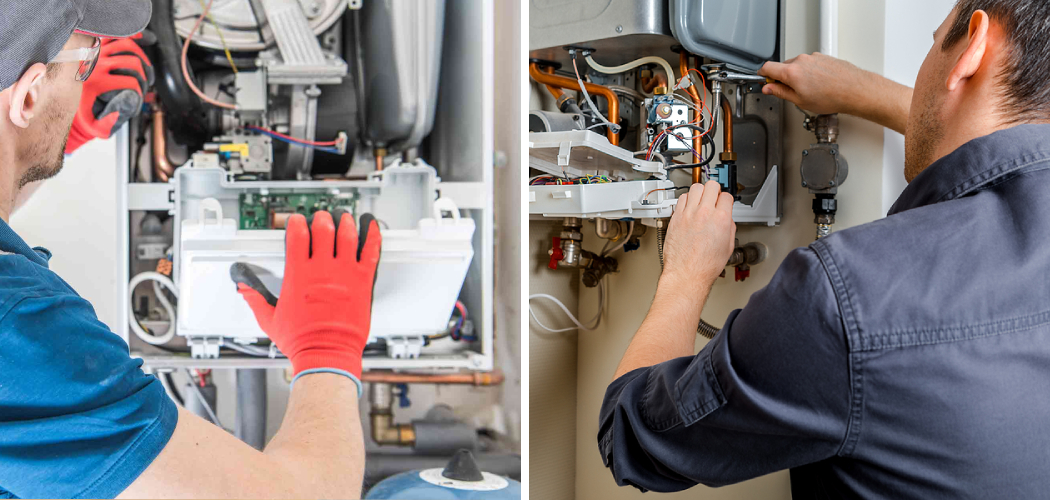Are you tired of dealing with a malfunctioning boiler every winter? Do you dread the constant and expensive repairs that come along with it? If so, you’re not alone. Boilers often require maintenance as they get older, causing homeowners to invest more money in repairs than in new systems.
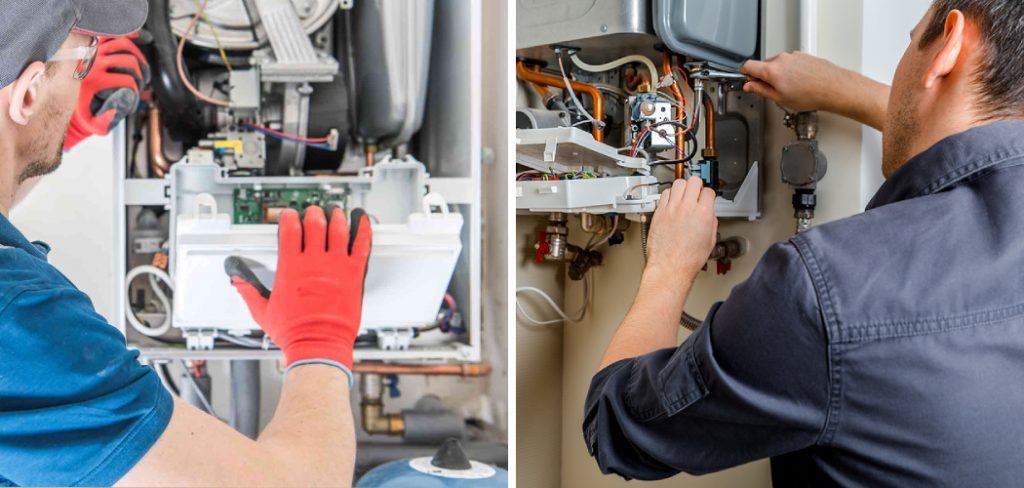
Luckily for you, this blog post will walk you through the steps of how to repair a boiler so that it can continue providing heat and comfort to your home – all without breaking the bank! By following our simple guidelines, allow us to show you how much easier it is for homeowners everywhere to maintain their boilers for lasting success.
Tools and Materials You Will Need to Repair a Boiler
- A screwdriver set
- Wrenches (open-end or adjustable)
- An adjustable pipe wrench
- Replacement parts (if needed)
- A bucket or container for water drainage
- Protective gloves and eyewear
Step-by-step Guidelines on How to Repair a Boiler
Step 1: Turn off the Power to Your Boiler
Before beginning any repair work, it is crucial to turn off the power supply to your boiler. This involves shutting down both the gas and electricity supply. Turning off the gas usually involves closing the valve next to your boiler, while shutting off electricity can be done by flipping the circuit breaker switch. You can never be too cautious when it comes to safety measures.
Step 2: Allow Your Boiler to Cool down
A crucial safety measure when repairing a boiler is to ensure that it has completely cooled down before working on it. This not only protects you from potential burns but also prevents any damage to the boiler. In addition, it is recommended to drain the boiler of water before proceeding with any repairs. Make sure to have a bucket or container handy to collect the water.
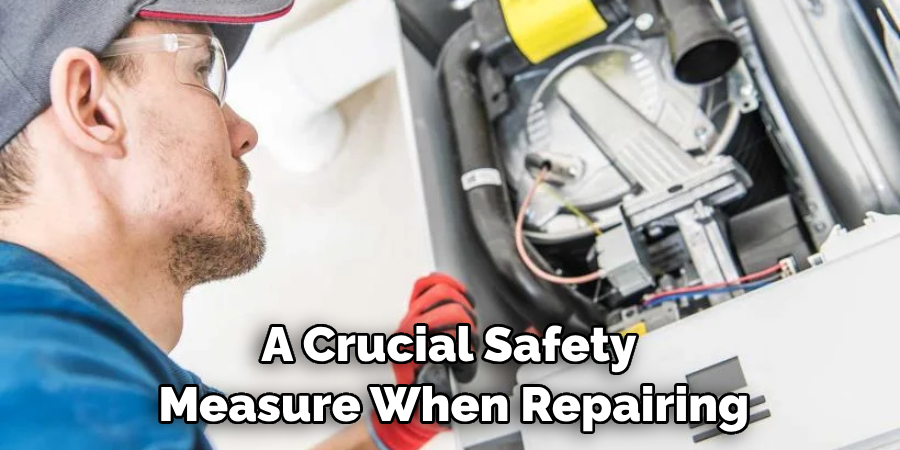
Step 3: Identify and Diagnose the Problem
To properly repair a boiler, it is essential to first identify what is causing the issue. Common problems with boilers include leaking pipes, faulty thermostats, and malfunctioning valves. Once you have identified the problem, you will be able to determine which parts need to be replaced. This will save you time and effort in the long run.
Step 4: Replace Faulty Parts
If your boiler requires replacement parts, make sure to choose high-quality ones from a reputable supplier. This will ensure that your boiler functions properly for a longer period. It is also crucial to refer to the manufacturer’s instructions when replacing parts, as each boiler may have specific requirements.
Step 5: Test Your Boiler
After replacing any faulty parts, it is important to test your boiler to ensure that the repairs were successful. Turn on the power supply and check for any leaks or unusual noises. If everything appears to be functioning properly, you can then turn the thermostat back on and adjust it accordingly. Make sure to monitor your boiler for any issues over the next few days.
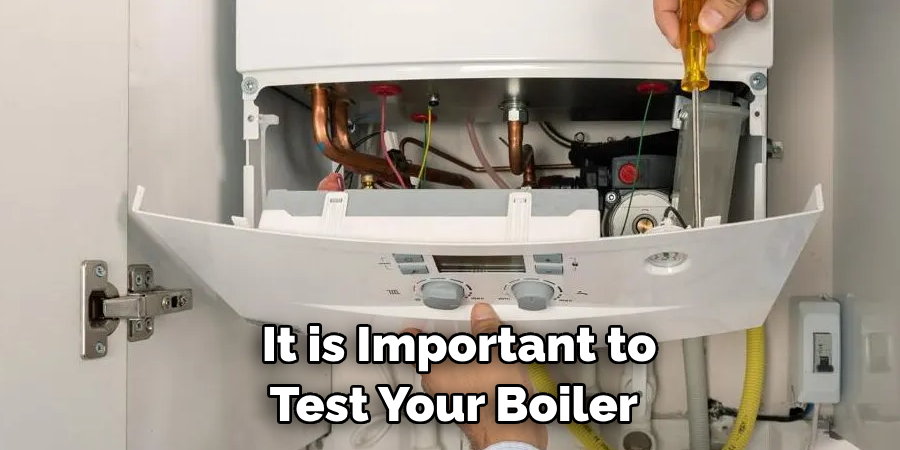
Following these steps will allow you to successfully repair your boiler and avoid any unnecessary expenses. However, it is important to note that if the problem persists or if you do not feel confident in making the repairs yourself, it is always best to consult a professional.
Regular maintenance and inspections can also help prevent major repairs in the future. By taking care of your boiler, you can ensure its longevity and keep your home warm during the colder months. So, make sure to follow these guidelines and stay safe while keeping your boiler in top condition. Happy repairing!
Additional Tips and Tricks to Repair a Boiler
- If you notice any leaks in your boiler, it is important to address them as soon as possible. Ignoring small leaks can lead to bigger problems and more costly repairs in the future.
- Make sure to regularly check and clean the burners of your boiler. A buildup of debris and dirt can cause issues with the ignition process, resulting in inefficient heating or even a complete breakdown of your boiler.
- Keep an eye on the water levels in your boiler. Low water levels can cause the system to overheat, which can lead to damage and potential safety hazards.
- If you have an older boiler, consider replacing it with a newer, more efficient model. Older boilers tend to be less energy-efficient and may require more frequent repairs and maintenance. Investing in a newer model can save you money in the long run.
- In addition to regular maintenance and repairs, it is also important to properly insulate your boiler and pipes to prevent heat loss. This can help improve the efficiency of your boiler and ultimately save you money on energy costs.
- If you are experiencing frequent issues with your boiler or notice any unusual noises or smells, it is best to call a professional for assistance. Trying to fix these issues on your own can be dangerous and may result in further damage.
- It is always a good idea to have a plunger handy for any clogs that may occur in the boiler pipes. However, if the issue persists, it is best to contact a plumber for more thorough cleaning or repairs.
- Regularly test the pressure relief valve on your boiler to ensure it is working properly. This valve releases excess pressure from the system and helps prevent potential explosions.
- If you live in an area with hard water, consider installing a water softener for your boiler. Hard water can cause mineral deposits to build up in the system, which can lead to clogs and reduce the efficiency of your boiler.
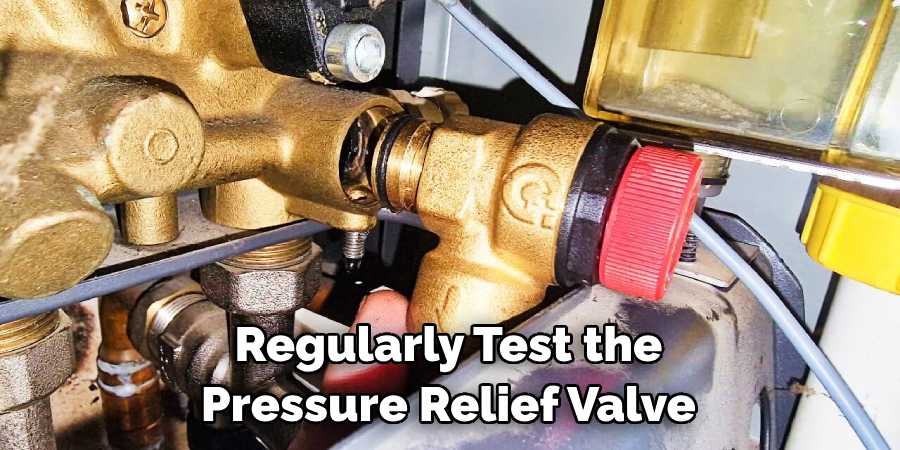
Following these tips and tricks can help keep your boiler in good working condition and prevent costly repairs. However, if you are unsure about how to perform any maintenance or repairs, always seek professional help to avoid any potential hazards. With proper care and attention, your boiler can continue providing efficient heating for many years to come.
Things You Should Consider to Repair a Boiler
- The first thing you should consider is the type of boiler you have. There are three main types: combi, system, and conventional boilers. Each of these has different components and requires specific repair methods.
- Know the age of your boiler as it can affect the type of repair needed. Newer models may have parts that are still under warranty, while older models may need to be replaced entirely.
- Always turn off the power and water supply before attempting any repairs. This will prevent accidents and further damage to your boiler.
- Check for any visible signs of damage such as leaks, cracks, or rust. If these are present, a repair is likely needed.
- Keep an eye out for warning signs such as unusual noises, reduced heat output, or a sudden increase in energy bills. These can indicate underlying issues that need to be addressed.
- It is always recommended to hire a professional and certified boiler repair technician for any major repairs. They have the expertise and knowledge to properly diagnose and fix any issues with your boiler.
- Regular maintenance of your boiler can prevent major repairs in the future. Make sure to schedule annual check-ups and follow the manufacturer’s guidelines for upkeep.
- If you are attempting to repair a boiler yourself, make sure to have all the necessary tools and equipment. This includes safety gear such as gloves, goggles, and a face mask.
- Be patient when repairing a boiler, as it may take time to properly diagnose and fix the issue. Rushing through the process can lead to further damage or incomplete repairs.
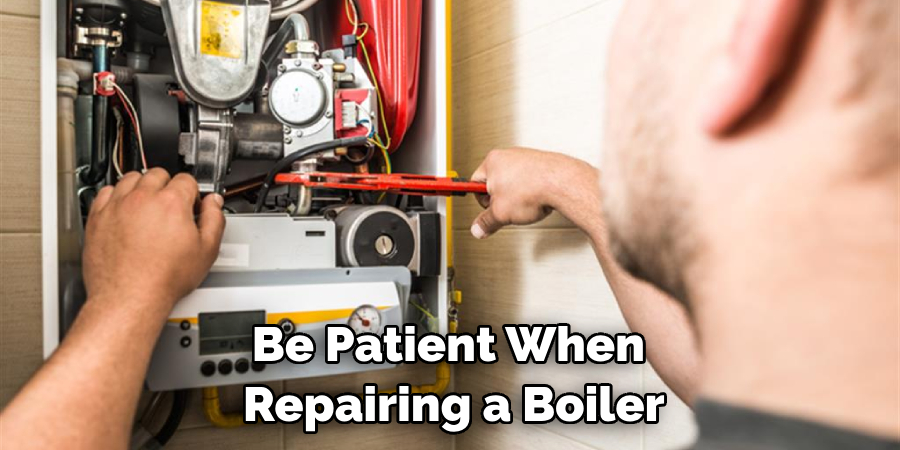
Following these considerations can help you effectively repair your boiler and ensure its safe and efficient functioning. Remember to always prioritize safety and seek professional help if needed. Boiler repairs can be complex, but with the right knowledge and approach, you can successfully fix any issues that may arise. So, don’t hesitate to take on the challenge and keep your boiler running smoothly for years to come. Happy repairing!
Precautions Need to Be Followed for Repairing a Boiler
- Before starting any repair work, make sure that the boiler is not connected to any power source. This will ensure your safety and prevent any accidents from occurring.
- Wear protective gear such as gloves and goggles to prevent burns or injuries while working on the boiler.
- Turn off the water supply and allow the boiler to cool down before attempting any repairs. Boilers can reach high temperatures and can cause serious burns.
- If you are dealing with a gas boiler, make sure to turn off the gas supply before starting any repair work. Contact a professional if you are not familiar with handling gas lines.
- Familiarize yourself with the layout and components of your specific boiler model before attempting any repairs. Refer to the manufacturer’s manual for guidance.
- Use proper tools and equipment for the job, and make sure they are in good working condition. Using faulty tools can be dangerous and result in improper repairs.
- If you suspect a major issue with your boiler, such as a gas leak or electrical malfunction, do not attempt to repair it yourself. Contact a professional technician immediately.
- Keep a fire extinguisher nearby in case of emergencies. Boilers can be a fire hazard and it is important to have a way to quickly put out any potential fires.

By following these precautions, you can minimize the risks involved in repairing a boiler and ensure your safety. It is always recommended to seek professional help for any major repairs or if you are not familiar with handling boilers. Safety should always be the top priority when working with any type of machinery or equipment.
Be cautious and take necessary safety measures to avoid accidents and injuries. Remember to never compromise on safety. In case of any doubts or concerns, do not hesitate to consult a professional technician. It is always better to be safe than sorry! Keep your boiler in good condition and it will serve you for years to come. Happy repairing!
Conclusion
Now you know how to repair a boiler when a problem arises. By following the steps outlined in this guide, you can quickly and effectively troubleshoot any issues that may occur with your boiler. Remember, safety should always be your top priority when dealing with a malfunctioning boiler. If you are unsure of how to proceed, it is always best to call a professional for assistance.

